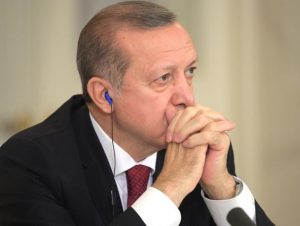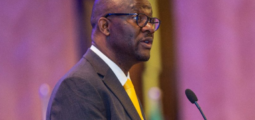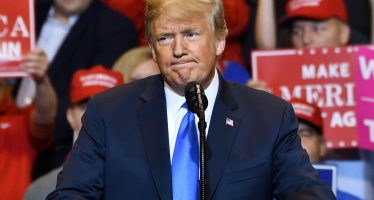Interest Rate Hike Key to Turkey’s Economic Fortune

Recep Tayyip Erdoğan
Amidst the cacophony produced by Messrs Trump and Jinping, the drumbeat of a small war was almost drowned out. Last month, a flotilla of eighteen Turkish warships converged on Kastellorizo, an idyllic island of the Dodecanese, to ‘protect’ a research vessel conducting seismological soundings to look for oil and gas on a part of the East Mediterranean continental controlled by Greece. Fighter jets from both countries flew at low altitude over the tiny island, just two kilometres off Turkey’s Anatolian coast, scaring startled sunbathers off the beaches with sonic booms.
Tensions subsided only after German Chancellor Angela Merkel told Turkish President Recep Erdogan in no uncertain terms that his display of military might was ‘completely unacceptable’. The word tantrum was reportedly mentioned. Chancellor Merkel also warned that any shooting would instantly trigger the imposition of comprehensive and crippling sanctions by the European Union. In a clear sign that US diplomacy no longer carries any noticeable weight, both Athens and Ankara lodged their appeals directly to Berlin, bypassing Washington altogether.
The chancellor’s swift and decisive intervention almost immediately convinced President Erdogan of the wisdom to recall his fleet and order the research vessel back to port. Just like it did to force through unanimous approval of the EU’s €750 billion post-pandemic recovery package, Germany flexed its financial muscle to remind Turkey who’s in charge – and calls the shots.
Admittedly, President Erdogan was an easy target. Whilst boisterous at home, his international standing as a regional powerbroker has weakened in tandem with the Turkish economy and the country’s increasingly precarious financial position.
Whilst President Recep Erdogan dispatches his navy on an impossible mission and fiddles with symbols of religion in nominally secular Turkey, Ankara is burning through its forex reserves at a rate that transcends caution. According to a recent estimate by investment bank Goldman Sachs, so far this year Turkey has spent some $60 billion in interventions to support the lira’s (undeclared) dollar peg. The country’s central bank leaned heavily on swap agreements to support $54.4 billion in short-term borrowing. As a result, the value net foreign assets – considered indicative of net reserves – dipped to minus $32 billion.
The forex interventions have mostly been an exercise in futility. Even though the central bank was spending $1 billion daily to support the currency, by the end of last month the lira had plunged to a near-record low against the euro. The slump was slightly less pronounced against the dollar, given its own weakness vis-à-vis the euro.
Market analysts and strategists seem hard-pressed to detect a silver lining and doubt the ability of the Turkish central bank to keep inflation down after President Erdogan again signalled his strong opposition to a rate hike.
With its benchmark interest rate at 8.25 percent and annual inflation currently running at 12.6 percent, the central bank has few, if any, options left. Market watchers now seriously consider the possibility of a ‘disorderly depreciation’ of the lira should the negative interest rates, and the resulting credit push, persist much longer.
After two consecutive years of running a modest (and exceptional) current account surplus, Turkey slid into a substantial deficit yet again after foreign investors pulled some $13 billion out of country and the pandemic kept tourists away. Last year, Turkey welcomed over 45 million visitors who spent some $32 billion. That crucial source of forex has almost completely dried up with the number of arrivals in June dropping by a staggering 96 percent and resorts reporting occupancy rates of five percent or less.
The plight of the country hasn’t improved with the Erdogan Administration’s moves to curb access of foreign investors to the country’s equity market. Late June, index provider MSCI warned that it mulls degrading Turkey to frontier market status after the government introduced a slew of measures that, amongst others, ban short selling and stock lending. To protect the Turkish lira against ‘unwarranted speculation’, three foreign-owned banks were temporarily banned from trading. In its annual review, MSCI noted that the steps taken have ‘severely restricted the ability of institutional investors to hedge portfolio risk’.
The corona pandemic has acerbated – and exposed – the systemic weaknesses that granted Turkey a place amongst the ‘Fragile Five’ – a term coined in 2013 by a financial analyst at Morgan Stanley to group emerging market economies that depend on notoriously fickle foreign investment to underwrite their growth ambitions. The five constitute a moving target. Some countries drop out whilst others are added. Morgan Stanley includes Turkey (alongside Argentina, Egypt, Pakistan, and Qatar) since November 2017. The list was originally compiled to denote countries suffering significant capital outflows in the wake of the 2008-2010 banking crisis and as a result were experiencing severe difficulties in bridging their current account deficit.
President Erdogan and Finance Minister Berat Albayrak, his son-in-law, seem to believe that Turkey can yet master the inherent contradictions of a pegged exchange rate and an independent monetary policy, all the while maintaining the free flow of capital. A self-declared enemy of the ‘interest rate lobby’, President Erdogan refuses to contemplate an end to the credit boom which benefits both households and businesses – and inflates growth. Distributed mainly via state-owned banks, credit volumes started to swell in the run-up to the March municipal elections. Whilst that, and a national spending splurge, pulled the country out of its recession, the economic rebound was not enough to avoid a poor showing at the polls.
Unable to put the genie back in the bottle with a virus raging and the economy tanking, the Erdogan Administration is betting on a relatively quick return to global normalcy which would see tourists flock to the beaches and rescue whatever remains of the season – and the national accounts. However, the gamble seems unlikely to pay off. A nascent second wave of infections may be taking shape, forcing millions to endure staycations this summer. Moreover, making waves with wargames and deploying the turquoise waters of the Eastern Mediterranean as a pawn in grandiose geopolitical manoeuvrings is probably not the way to revive the country’s fortunes.
You may have an interest in also reading…
Trumpism 2.0: Message to Survive Delivery Malfunction
A disconnect between the medium and Trump’s message deprived the incumbent President of a second term in office. However, seventy
Business in Times of Corona: Steering Economies by Dead Reckoning
Ridiculed and even vilified last week for refusing to drive interest rates deeper into negative territory, President Christine Lagarde of
Orban on Orbán: Cease and Desist, Your Position Is Untenable
Europe’s other ‘Orban’ sounds much more reasonable than the vociferous original one. Prime Minister Ludovic Orban of Romania yesterday chastised

















































































